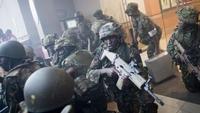-
Shots exchanged near Capitol Hill, suspect – a woman -- hit

Shots were exchanged around 2:15 p.m. this afternoon outside the Hart Senate Building on Capitol Hill between police officers and a lone gunmen. Congressional buildings on both the Senate and the House side were placed under lock-down for about an hour. The lock-down was lifted at 3:00p.m. Police said the fire was exchanged between police officers and a woman in a black car, who had earlier was driving suspiciously near the White House. She sped away from the White House when police approached her, and sped toward Capitol Hill.
-
-
Serious IT consequences if shutdown lasts
The shutdown of the federal government, if it lasts no more than a week or so, will not seriously damage government IT operations, experts and industry insiders say. A longer shutdown, which would lead to extended furloughs for non-essential employees, will have more serious effects, as it will further depress the federal technology workforce and will deter top graduates from applying for government jobs. If Congress refuses to allow payment to furloughed employees for the time they were idled, the effect will be even more pernicious, these experts said.
-
-
Terrorism hobbles business investment in north, east Africa

Images of the terrorist attack in Nairobi’s Westgate Mall have reinforced the belief that business investment in those parts of Africa where terrorist groups are active is risky despite improvements in living standards.
-
-
Restricting license plate readers undermines law enforcement: study
White paper argues that Massachusetts legislation restricting the use of license plate readers (LPRs) is rooted in exaggerated fears and misconceptions, and will reduce effectiveness of LPR technology and weaken law-enforcement’s efforts to pursue criminals.
-
-
Societies with rigid cultural values produce more terrorists

Examining more than 80,000 terrorist attacks which occurred between 1970 and 2007, researchers find that cultural values and norms which promote rigid thinking are related to a greater number of terrorist attacks or fatalities. Societies that have the belief that one’s destiny and life events are predetermined (fatalism), have very strong norms and severe punishments for deviation from norms (cultural tightness), and those that privilege masculinity and have very distinct gender roles (low gender egalitarianism) have higher terrorism rates than those that are low on these dimensions.
-
-
Violent hate crimes, lone-wolf terrorism share characteristics
Researchers examined the timing, locations, methods, targets, and geographic distributions of lone-actor terrorist attacks, group-based terrorist attacks, and violent hate crimes that occurred in the United States between 1992 and 2010. They found that locations where the 101 lone-actor terrorism incidents occurred shared more demographic similarities with the locations of the 46,000 violent hate crimes than with the locations of 424 group-based terrorist attacks over the time period.
-
-
Boko Haran Islamists kill 78 college students

Boko Haram, the name of the Nigerian Jihadist Islamist insurgency group, means “Western Education is Sinful.” True to its name, the group has routinely attacked high schools and colleges in Nigeria, killing a large number of students and teachers. The latest attack came Saturday night, when Boko Haram militants attacked an agricultural college in northeastern Nigeria, killing seventy-eight students.
-
-
Two generals fired for costly Afghanistan failure
Gen. James F. Amos, the commandant of the Marine Corps, yesterday fired two generals for failing properly to protect a U.S. base in southern Afghanistan, allowing Taliban fighters to storm it last year, killing two Marines and destroying a half a dozen U.S. fighter jets. Military historians note that the last two-star general to be fired for combat incompetence was Army Maj. Gen. James Baldwin, who was relieved of command in 1971 under similar circumstances: the North Vietnamese attacked a poorly protected U.S. outpost, killing thirty soldiers.
-
-
Training people to fight terrorism at grassroots
Secretary of State John Kerry, in a Friday speech to the Global Counterterrorism Ministerial Forum, unveiled a new U.S. initiative to address the root causes of violent extremism. The United States will increase its contribution to the Global Counterterrorism Forum, and create two training centers to help train people in fighting terror attacks: one center — the Center for Excellence in Countering Violent Extremism – is already open in Abu Dhabi, and a second, called the International Institute of Justice and the Rule of Law, will open in Malta next year.
-
-
Powerful groups abandon rebel coalition, join Jihadist al Nusra Front

The Syrian rebel coalition fighting the regime of President Bashar al-Assad – its official name is the National Coalition of Syrian Revolutionary and Opposition Forces, and it is led by Ahmad al-Jarba — has suffered a major blow Tuesday when eleven rebel groups, among them some of the most powerful ones in the rebel coalition, announced they were abandoning the coalition and joining forces with al Nusra Front, an al Qaeda-affiliated group. Among the eleven groups are secular groups aligned with the Western-backed opposition’s Supreme Military Council. It thus appears that the move by the eleven groups was motivated less by ideological or religious considerations, and more by an assessment that strengthening the al Nusra-led side among the rebels would be a more effective way to bring down the Assad regime.
-
-
Robust fourth-generation nuclear fuel withstands high-temperature accident conditions

A safer and more efficient nuclear fuel is on the horizon. A team of researchers at the U.S. Department of Energy’s Idaho National Laboratory (INL) and Oak Ridge National Laboratory (ORNL) have reached a new milestone with tristructural-isotropic (TRISO) fuel, showing that this fourth-generation reactor fuel might be even more robust than previously thought.
-
-
Number of U.S. drone strikes in Pakistan, Yemen significantly reduced
In the past several months, the United States has reduced the number of drone strikes on terrorist targets in Pakistan and Yemen. The United States launched 117 drone strikes in Pakistan in 2010, compared to twenty-one so far this year. Representative Mike Rogers (R-Michigan), chairman of the House Permanent Select Committee on Intelligence, is concerned. “[The threat of terrorism is] not diminishing,” he said. “There have been counterterrorism changes made by the administration that have concerned us all, things that we’ve been working on for a period of months that we’re trying to work through that are very, very concerning. This is no time to retreat.”
-
-
Rouhani says the Holocaust did happen, and that it was reprehensible – or does he?
Iran president Hassan Rouhani’s predecessor, Mahmoud Ahmadinejad, denied the Holocaust ever happened, and once a year convened a conference of Holocaust deniers in Tehran in which a sundry crackpots presented what they described as studies proving that the Holocaust was a Jewish myth. In a CNN interview yesterday, he said that “the crime that the Nazis committed towards the Jews, as well as non-Jewish people — is reprehensible,” but added that he would leave it to historians to judge the “dimensions of the Holocaust.” The official Iranian news agency Fars was quick to accuse CNN of mistranslating Rouhani’s words. It posted its own translation of Rouhani’s answer to CNN’s question, and claimed that he did not use the word “reprehensible” and that he said historians should be left to judge “historical events,” not “the Holocaust.”
-
-
Series of spectacular attacks indicates growing weakness of African terrorist groups: experts

Islamic terrorists in Africa launched a few spectacular attacks this year, the last one on the Westgate mall in Nairobi. Terrorism experts argue, however, that such spectacular attacks may, in fact, be a sign of growing weakness, even desperation, on the part of these terrorist groups, rather than a sign of strength and confidence. These experts say these attacks, and other, smaller ones, may well be the result of the growing challenges these various Jihadi groups face, and an indication that these groups are now on the defensive.
-
-
Al Qaeda increases efforts to defeat U.S. drones

Drone attacks have been an important part of America’s war against terrorism. These airstrikes have considerably limited the movements and operational freedom of al Qaeda operatives and other militants in Pakistan, Afghanistan, Yemen, and Somalia. Al Qaeda has been exploring strategies and experts to allow it to counter America’s drone campaign.
-
More headlines
The long view
Factories First: Winning the Drone War Before It Starts
Wars are won by factories before they are won on the battlefield,Martin C. Feldmann writes, noting that the United States lacks the manufacturing depth for the coming drone age. Rectifying this situation “will take far more than procurement tweaks,” Feldmann writes. “It demands a national-level, wartime-scale industrial mobilization.”
No Nation Is an Island: The Dangers of Modern U.S. Isolationism
The resurgence of isolationist sentiment in American politics is understandable but misguided. While the desire to refocus on domestic renewal is justified, retreating from the world will not bring the security, prosperity, or sovereignty that its proponents promise. On the contrary, it invites instability, diminishes U.S. influence, and erodes the democratic order the U.S. helped forge.
Fragmented by Design: USAID’s Dismantling and the Future of American Foreign Aid
The Trump administration launched an aggressive restructuring of U.S. foreign aid, effectively dismantling the United States Agency for International Development (USAID). The humanitarian and geopolitical fallout of the demise of USAID includes shuttered clinics, destroyed food aid, and China’s growing influence in the global south. This new era of American soft power will determine how, and whether, the U.S. continues to lead in global development.
Water Wars: A Historic Agreement Between Mexico and US Is Ramping Up Border Tension
As climate change drives rising temperatures and changes in rainfall, Mexico and the US are in the middle of a conflict over water, putting an additional strain on their relationship. Partly due to constant droughts, Mexico has struggled to maintain its water deliveries for much of the last 25 years, deliveries to which it is obligated by a 1944 water-sharing agreement between the two countries.
How Disastrous Was the Trump-Putin Meeting?
In Alaska, Trump got played by Putin. Therefore, Steven Pifer writes, the European leaders and Zelensky have to “diplomatically offer suggestions to walk Trump back from a position that he does not appear to understand would be bad for Ukraine, bad for Europe, and bad for American interests. And they have to do so without setting off an explosion that could disrupt U.S.-Ukrainian and U.S.-European relations—all to the delight of Putin and the Kremlin.”
How Male Grievance Fuels Radicalization and Extremist Violence
Social extremism is evolving in reach and form. While traditional racial supremacy ideologies remain, contemporary movements are now often fueled by something more personal and emotionally resonant: male grievance.
